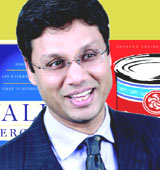 Nirmalya Kumar
Nirmalya Kumar Professor of marketing,
Faculty Director for Executive Education,
Director of Centre for Marketing,
Co-Director of Aditya Birla India Centre at London Business School.

income per capita than the average of the
country. Why? Because rich people
do not need to prove to other people,
by buying the premium brand. On
the other hand, poor people want to
buy premium brands to show that
they are rich. Poor people are always
more brand conscious than rich.
The other phenomenon is
education. Themore educated you are,
the more likely you buy private labels
because you can make independent
quality assumptions and you don't
need the symbolic crutch of the brand.
When we look at the evolution
part, you find growth so much in
Europe vis-Ă -vis rest of the world. Do
you see any specific reason for it?
Yes, it's retail consolidation. Retail in
Europe is highly consolidated. For
example Tesco's market share in UK is more than 20%. Migros market
share in Switzerland is more than
20%. When you are the 20% of the
market you can do whatever you
want and you can get best plan of the
game that is what we have shown in
the book chapter 4 or 5 that
premium Tesco brand cheese, Tesco
brand orange juice, Tesco brand
chocolates sells more than Craft
cheese, more than Tropicana orange
juice and more than Cadbury's.
Tesco's chocolate sells for 50% higher that Cadbury's chocolate in
price. That is enough to show it in
the premium brand. A Tesco's finest
chocolate sells at 50% price
premium over the Cadbury's. A
Tesco's finest orange juice sells over
the price premium of Tropicana
orange juice. A Tesco's finest yogurt
sells for a price premium over all of
the big brands. That is incredible. So
when these people are able to get
price premium, why price
reduction.
When you look at Asia especially
may be Japan where Wal-Mart is
struggling for lot many years and in
China may be making about just in
roads now. Do you see that kind of
growth happening?
Japan private label is growing
very fast and has achieved quite a
mass.
Is it that one reason why Wal-
Mart is not doing well?
No, Wal-Mart's reason is different.
The reasons are retail is the game of
skill. If you don't have skill you are
not going to be there.
But Japan is supposed to be the
second biggest retail market.
Wal-Mart, itself does not have
skill. As a retailer you need to have
skill because if you have strategy in
retail based on price, you have to have
skill on market. Because if you don't
have skill your cost cannot be lower
than your competitors and you can't
make price strategy. So challenge
therefore is to get the skilled.
What happens to lets say China.
China is a nascent market right now.
Everybody is competing in China now,
trying to get share of the market.
China's private label is small like India.
What if people misunderstand
private labels as knockoffs?
A lot of private labels are knockoffs.
But the thing is that traditional
private labels are cheaper, but at the
same quality, almost. But now the
new private labels are all about the
same quality and cheaper or better
quality and cheaper.
If you look at the Indian retailing
industry may be in last 4 to 5 years,
when reliance and other people has
taken off, howdo you see themwhen
compared to rest of the world?
They are 20 years behind right now.
So, to develop good private labels for
them would take 10 to 20 years. But
sure itwill happen. Twenty years from
nowwewill be talking about the same
problems in India, no doubt.
One recent thing that has
happened in India is, almost one
year later it seems reliance has
taken almost a U-turn. Reliance
fresh, now its getting into general
merchandising do you see any
problems there?
I do not know anything about their
format. But, all I can say about
retailing in India is there will be
multiple formats and multiple
players. Retail is never winner taken
all the game.
